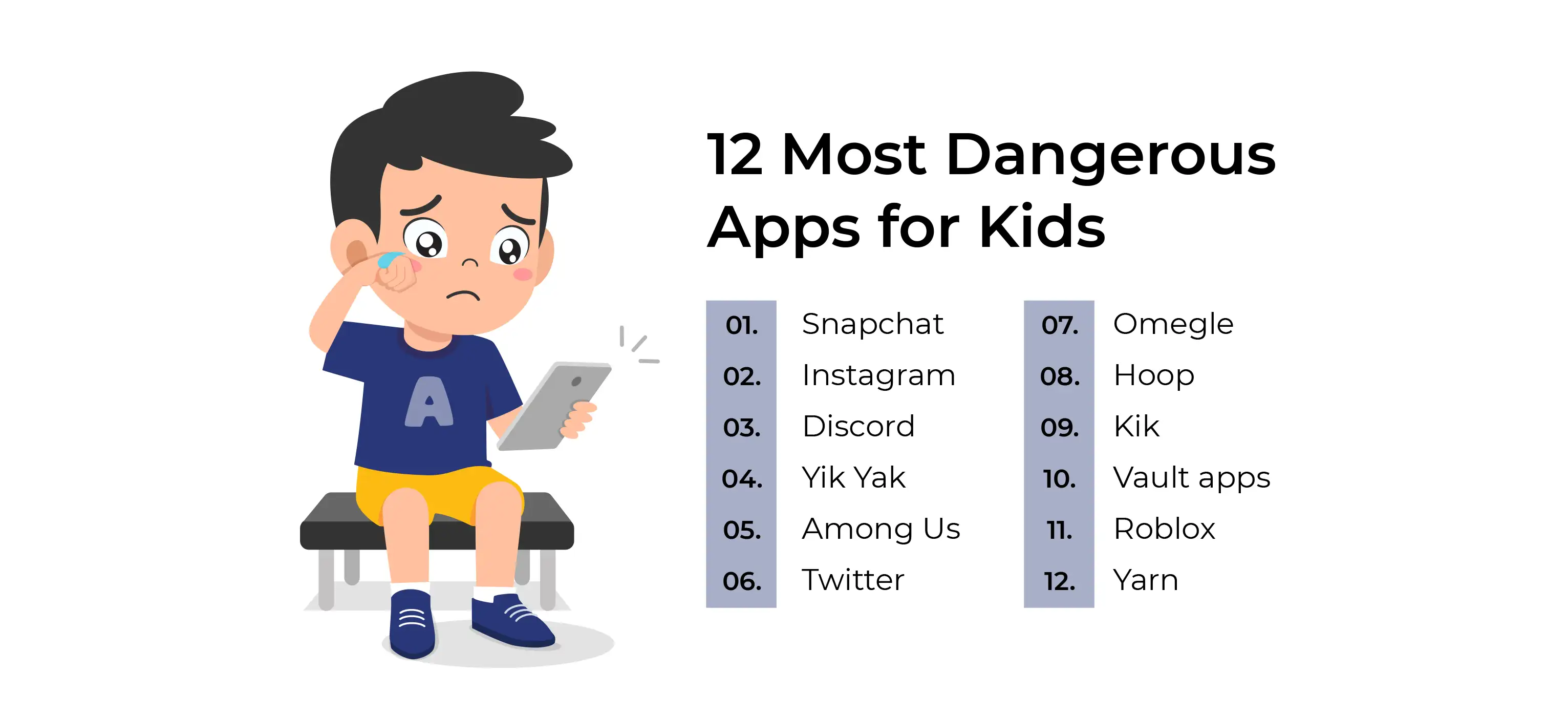 Satendra K
Dec 05, 2024
Satendra K
Dec 05, 2024

One common issue faced by parents worldwide is how kids are becoming obsessed with smartphones. With the evolution of technology, it is becoming more and more difficult to ensure the safety of children in cyberspace. Trends keep changing and new apps are released in the market every day. This makes it hard for parents to keep track of the apps that might prove to be harmful to their kids.
Even though the internet is useful, you can never be certain of its potential dangers. Some apps are filled with inappropriate content for kids, and some might even put them in risky situations. Therefore, it is important for parents to familiarise themselves with apps that are dangerous for kids.
Most apps that we consider being safe are, in reality, not appropriate for the use of kids. According to a recent study conducted by Bark, the following are the most widely used apps that are actually dangerous for kids.
Snapchat is an American multimedia instant messaging app that was released in 2011. It popularised the trend of disappearing messages. But one thing that kids don’t realize is that nothing really disappears on the internet. Snapchat not only lets users share nude photos, but it also exposes young people to other risks.
Instagram is one of the most popular social media networking platforms in the world. It is a photo and video-sharing platform owned by Facebook. The danger associated with Instagram is how it distorts reality. It promotes an ideal world where everything is perfect and people often end up believing everything that they see on Instagram. Another threat posed by Instagram is how easily kids can access inappropriate content. Even though the app has taken certain measures to create a safe environment for its younger users, most of these are ineffective or children can easily turn them off.
Teens who play video games together often use Discord to communicate with one another. It’s a messaging platform that features chatrooms, direct messaging, voice chat, and video calls. And it is one of the most dangerous apps for kids as it can expose them to all kinds of online threats, from hate speech and porn to bullying and online predators. Since Discord is used by people belonging to all kinds of age groups, it would be easy for kids to get influenced by adults with bad intentions.
Yik Yak is a social media app that was initially launched in 2013 and then relaunched in 2021. It enables users within a five-mile radius to read publicly posted messages. It is an anonymous chatting app and has no user names, no handles, no real names, and no photos. This is the major reason for this app being dangerous for kids. Yik Yak is a breeding ground for bullying as it offers anonymity and can even be used for spreading malicious rumors.
This is a popular whodunnit mystery video game that looks innocent at first look. The game, which is made for 4 to 10 players, pits players against one another as they try to discover who the mysterious murderer aboard their starship is. Among Us made the list of apps that are dangerous for kids because of the chat function in the game. The chat room function is used during emergency meetings to discuss who the imposter might be. Profanity and violent language can be common and the game also allows you to play with strangers, which is also a cause for concern.
Twitter is typically considered an app for breaking news, celebrities, and stand-up comedians. But it also contains a lot of inappropriate content. Kids know this and often use Twitter to access such content. Most parents are not aware of this. The fact that children don’t require a Twitter account for accessing such content is also worrying.
Omegle is a platform for an anonymous video chat that connects you with a total stranger anywhere in the world. Children have been known to use Omegle in groups while having sleepovers. This is really concerning, as kids can be exposed to nudity and even real-life sex acts on screen when using apps like Omegle. Predators can lurk on the website, grooming kids and capturing images and videos of their interactions.
Hoop is like a combination of Tinder and Snapchat where kids as young as 12 are allowed to form connections with total strangers. Users can choose who they'd like to start a chat with by swiping through profiles, which contain the person's age, gender, and images. Then, they can tap a button to ask for that person's Snapchat username so they can carry on the conversation there. Even though Hoop claims that users over 18 won’t be shown kids’ profiles (and vice versa), it is still a matter of concern.
Kik is a free instant messaging/chat app. Even though the company states that it is safe for children of age 13 and above, the app store rates it as inappropriate for anyone younger than 17. This is because the app can expose children to sexual content. Also, as the app allows children to chat with strangers, the potential for predation is enormous.
Vault apps are used to conceal stuff on tablets and phones, including files, images, and other apps that children don't want their parents to be aware of. One such popular app is a fake calculator app. These apps occasionally ask you to enter a passcode to access them. Whether they’re hiding off-limits apps like Snapchat or even inappropriate photos, nudes, or racy memes, vault apps can spell trouble.
Roblox is an open-world video game wildly popular with kids 5–12. Roblox is a platform that hosts tons of games created and published by users. Like with any program featuring user-generated content and an in-game chat element, there is always a possibility that children will come across inappropriate content while using it. This could range from profanity and sexual content to drugs and alcohol.
Yarn is a reading app but is not at all suitable for kids. It tells stories through fake text messages and some stories are not at all appropriate for kids.
Nowadays, parents don't know about their children’s social media whereabouts. Therefore, it is hard for them to keep track of their kids’ online activities. There are many ways in which parents can ensure the safety of kids when they are online. Using parental control tools is one way of doing this. There are a lot of parental control tools available in the market and parents can choose the ones that are most suitable for their needs.
Being safe when using social media apps is more challenging than ever now. It is even more difficult to determine which apps are harmful to your kids. As per recent research, it was found that 1 in 5 apps in a popular app store doesn’t adhere to the Children’s Online Privacy Protection Act (COPPA). This makes it really hard for parents to determine which apps are safe for their kids.
Even though most adults know about the risks associated with apps that collect user data, that is not the case with children. Most apps developed for kids often collect sensitive data like device location, contact info, browsing history, financial info, and contacts. Even if the data has been anonymized, it is still incredibly useful to advertisers and can be used to build a comprehensive profile of your child. This can cause a lot of harm if it ends up in the wrong hands. Children don’t realize these risks and often end up giving the apps access to their private details.
In January, a survey was done by the UK-based toy review site TheToyZone to identify the most privacy-invasive kids' apps. The group's research found that money management apps (like Greenlight Kids & Teen Banking, Till, and RoosterMoney) are the most data-hungry and collect an average of 10 types of data per app. Greenlight was found to be the most invasive app by collecting 22 types of data.
Parents should keep in mind the following factors in order to ensure that an app is safe for their kids:
Parents can also talk to their kids about internet safety. You can’t be with your kids all the time, which is why it's in your best interests to make the most of the time you have by discussing internet safety or cybersecurity measures and kid-friendly apps with your child.
Parental control software helps keep your family and kids safe online when using Windows, macOS, Android, and iOS. The following are some of the tools that are worth considering if you’re looking for the best parental control software.
Apart from using the above-mentioned tools, it is necessary that parents talk to their kids about internet safety. It is equally important to assure your kids that they can come to you if they ever find themselves in any kind of trouble.
Since children are constantly exposed to technology and the internet, it is important to educate them about how to be safe when online.
It is important for parents to monitor and control their children's app usage to ensure that they are not exposed to any potential dangers. Teach children about online safety and explain the dangers of downloading or using certain apps. Encourage children to use apps responsibly and only download or use apps that are appropriate for their age and development level.
Here is the list of other major locations where Edoxi offers Cybersecurity Certification Courses
Cyber Security Courses in Dubai | Cyber Security Courses in Qatar | Cyber Security Courses in Muscat |

Chief Technology Officer & Cyber Security Expert Trainer
Satendra Singh Khari is a renowned cybersecurity expert and the Chief Technology Officer at Edoxi, where he leads the CEH v13 AI program. With over 12 years of experience, he has trained more than 10,000 professionals and earned recognition in the Circle of Excellence for 2023 and 2024. Mr. Khari holds multiple industry certifications, including CISSP, CISM, CEH, CPENT, and CREST, which showcase his expertise in vulnerability assessment, penetration testing, and incident handling.
His practical insights, gained during his tenure as Head of Information Security in Malaysia, enhance the learning experience by providing students with essential technical skills and a clear path to career advancement. Recognized as a leader in his field, he has received the Internet 2.0 Outstanding Leadership Award for three consecutive years (2022-2024), reflecting his dedication to empowering the next generation of cybersecurity professionals.